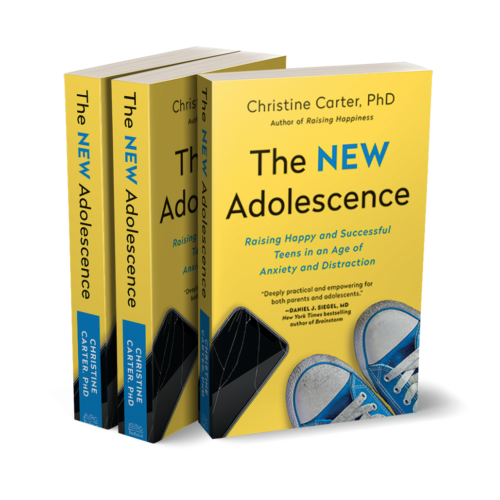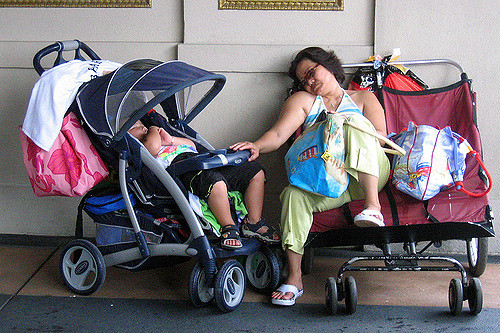“Wow. Ugh. That’s amazing!”
This is the usual wide-eyed response when people hear that I have four teenagers. Sometimes people grimace, like the mere thought of it is a bitter pill. They are thinking, I know, that teenagers are hard, which, of course, they can be. Everyone assumes I must be insanely busy, or maybe just a little insane, and that raising four teenagers must be nearly impossible.
 These thoughts occur because many teenagers tend to be either terribly disorganized, requiring constant nagging, or tightly wound, perfectionistic, and in need of constant therapy. There’s also all that new neuroscience showing, unfortunately, that the brain regions that help humans make wise choices don’t mature until kids are in their mid 20s, and that many potentially life-threatening risks become more appealing during adolescence while the normal fear of danger is temporarily suppressed. Knowing these things can make it hard for us parents to relax.
These thoughts occur because many teenagers tend to be either terribly disorganized, requiring constant nagging, or tightly wound, perfectionistic, and in need of constant therapy. There’s also all that new neuroscience showing, unfortunately, that the brain regions that help humans make wise choices don’t mature until kids are in their mid 20s, and that many potentially life-threatening risks become more appealing during adolescence while the normal fear of danger is temporarily suppressed. Knowing these things can make it hard for us parents to relax.Though teenagers can be hard to parent, the good news is that parenting teenagers is in many ways a hell of a lot easier than raising little kids. For this to be the case, however, our parenting needs to shift. Here are the three big shifts that parents of teenagers need to make to survive their kids’ adolescence.
1. We step down as primary decision-makers and step up our coaching
When our kids are little, we have to manage pretty much every aspect of their lives. We set bedtimes, plan meals, and make doctor’s appointments. We arrange carpools and make all major decisions: where they will go to school, if they will go to camp, and where we’ll go on vacation. And when our kids are little, for the most part, they appreciate having involved and loving parents. It’s great having someone else manage your calendar and get you to your activities (mostly) on time.
But once kids reach adolescence, they need to start managing their own lives, and they do tend to fire us as their managers. Parents who are too controlling—those who won’t step down from their manager roles—breed rebellion. Many kids with micromanaging parents will politely agree to the harsh limits their parents set with a “yes, sir” or a “yes, ma’am” attitude, but then will break those rules the first chance they get. They don’t do this because they are bad kids, but because they need to regain a sense of control over their own lives.
The answer, according to neuropsychologist William Stixrud and long-time educator Ned Johnson, authors of The Self-Driven Child, is to hand the decision-making reins over to our teens. You read that right: By adolescence, we parents need to (take a deep breath and) let them make their own decisions about their lives. It’s not that we never say no anymore. Nor do we stop enforcing our family rules. It’s that we start to involve teens more in creating the rules, and we let them make their own decisions—which they are going to do anyway.
Letting our kids become the primary decision makers does NOT mean that we become permissive, indulgent, or disengaged. It does mean that the quality—if not the quantity—of our support shifts. We give up our role as their chief of staff and become more like life coaches. We ask questions, and provide emotional support.
2. We influence them differently
It’d be great if we parents could just download information to our teens—say, about sex and drugs—and know that they were going to use that information to make good decisions.
But giving teenagers a lot of information isn’t an effective way to influence them anymore. Interesting research on this topic shows that what is effective for elementary school children—giving them information about their health or well-being that they can act on—tends to be mostly ineffective for teenagers.
This is because adolescents are much more sensitive to whether or not they are being treated with respect. The hormonal changes that come with puberty conspire with adolescent social dynamics to make teenagers much more attuned to social status. More specifically, they become super touchy about whether or not they are being treated as though they are high status.
In the teenage brain, the part of themselves that is an autonomous young adult is high status. The part of them that is still a kid who needs our support is low status. They might be half independent young adult, half little kid, but they are hugely motivated to become 100 percent autonomous…even if they do know, on some level, that they still need our support and guidance.
When we give our adolescents a lot of information, especially when it is information that they don’t really want or that they think they already have, it can feel infantilizing to them. Even if we deliver the information as we would to another adult, teenagers will often feel disrespected by the mere fact of our instruction.
So, when it’s time to bring up the topic you want to influence your teen about, speak as you would to someone with the highest possible social status—someone you really, really respect. (I have to literally imagine that person in my head, and then imagine both the tone and the words I would use with that person.) Remember, if your teen feels disrespected, nagged, spoken down to, pressed upon, or infantilized, all bets are off.
3. We have a lot of hard conversations
Remember what you used to talk about with your kids before they hit puberty? There are days when I’d give anything to just be able to talk again about favorite foods and favorite colors and the tooth fairy. It isn’t that every conversation was easy when they were young, but I rarely felt the kind of discomfort I now feel while talking to my kids about things like sex—or even their college applications. What starts as a casual conversation can quickly become an emotional minefield. It’s hard not to let our own agendas creep in. And it can be really hard to manage our own big feelings about things.
Talking with teenagers about their lives can be stressful. But teenagers today are dealing with some really hard stuff, and we parents need to create safe spaces for our teens to talk about the hard things.
This takes a lot of courage. The simplest way to increase our ability (and, frankly, willingness) to have uncomfortable conversations with our teens is to practice doing it in baby steps. Instead of thinking about having a “big talk,” broach a difficult topic in short observations and simple questions. Let teens lead; our real value comes when we listen rather than instruct. Even when we have a lot to say, it’s more important to give them a chance to speak, to work out what they are thinking in a low-risk environment. Practice staying calm despite the discomfort. Keep taking deep breaths. Keep relaxing your shoulders. Notice your discomfort, and welcome it. It’s nothing to be afraid of.
As hard as it might be for us to watch, our teenagers are going to make mistakes. When they do, our anxious over-involvement won’t help. What will help, though, is our calm presence. This is more good news, because it is far more enjoyable to practice calm presence than it is to freak out.
Above all, we’ll do well to remember that their lives are their lives. It’s their journey, not ours. Our role is not to steer them through life like we would marionettes, but rather to help them feel seen, and to help them feel safe. For that, we need only to coach instead of manage, listen instead of instruct, and breathe through our discomfort.
This essay is adapted from The New Adolescence: Raising Happy and Successful Teens in an Age of Anxiety and Distraction (BenBella Books, 2020, 230 pages).
If you’re in the Bay Area, we hope you’ll join us for the launch at the Hillside Club on February 20, 2020! Find more information about my book events here.













